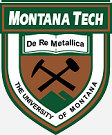Difference between revisions of "Welcome to Montana Tech's High Performance Computing Cluster"
From Montana Tech High Performance Computing
| Line 25: | Line 25: | ||
</div> | </div> | ||
| − | <h3 class="subheader"><span class="fa fa-bolt fa-lg"></span> | + | <h3 class="subheader"><span class="fa fa-bolt fa-lg"></span> Current Uses </h3> |
| + | |||
| + | * Multiphysics Simulations | ||
| + | * Molecular Dynamics | ||
| + | * Statistical Simulations | ||
| + | * Teaching | ||
| + | |||
| − | |||
| − | |||
| − | |||
| − | |||
| − | |||
| − | |||
| − | |||
| − | |||
<h3 class="subheader"><span class="fa fa-handshake-o fa-lg"></span> Collaborations </h3> | <h3 class="subheader"><span class="fa fa-handshake-o fa-lg"></span> Collaborations </h3> | ||
Revision as of 14:20, 29 August 2017
Supporting the Computational Science and Research Needs of Montana
Montana Tech's High Performance Computing (HPC) architecture has been designed to support collaborative research and instruction within Montana and Montana University System (MUS). Funded by the Montana Department of commerce as a MUS-wide initiative, this computing cluster is available to faculty, students, researchers, and public/private industry collaborators.
HPC Cluster
Montana Tech's HPC is a small cluster consists of 22 nodes with 352 cores (704 with Hyper-threading). Two of the nodes are GPU nodes adding 7488 CUDA cores. The nodes are connected with 40Gbps InfiniBand and have access to 91 TB storage sytems. The theoretical peak performance of the entire cluster is about 13 TFLOPS.
Data Visualization
Associated with the HPC are two 3D data visualization systems with a variety of visualization software packages. Both 3D visualization systems are equipped with either 108" stereo projection wall or 70" 3D TV, shutter glasses, and a tracking system to enable researcher to directly interact with the 3D imagery.
Current Uses
- Multiphysics Simulations
- Molecular Dynamics
- Statistical Simulations
- Teaching
Collaborations
Montana Tech. currently pays for the system support. We hope current and future researchers will incorporate the facilities into their grant proposals to fund system expansion and future support. Rsearchers can also propose infrastructure expansions, if funding is available.

